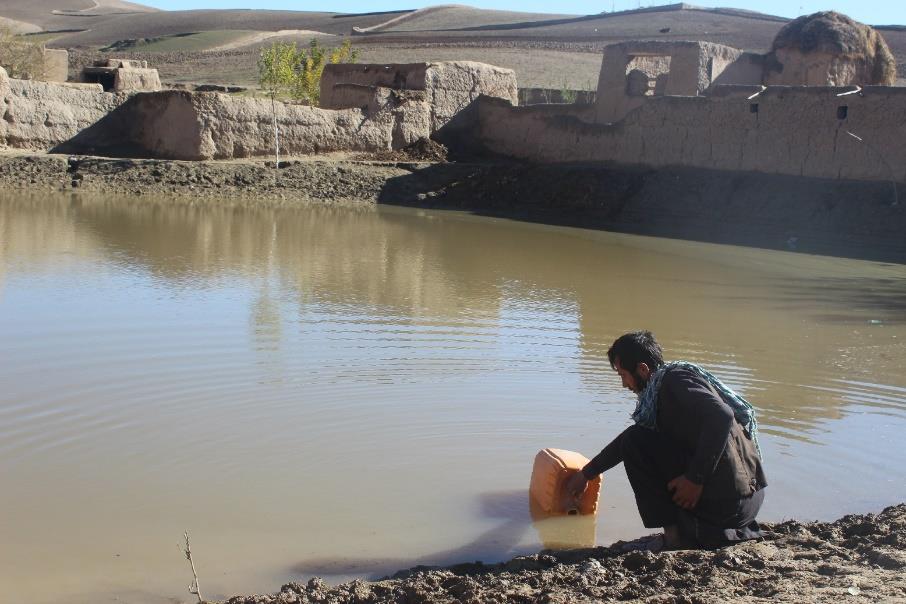Long-term solutions must be prioritized in Afghanistan

Afghanistan is already the world’s largest humanitarian aid program, leading many lists of the worst humanitarian crises. The heartbreaking reality is that without successful intervention, the situation in the country will only get worse, and the communities in Afghanistan will continue to suffer, particularly the most marginalized, especially women and girls.
Recovery can begin at any time during or after a crisis. Longer-term solutions that tackle the root causes of crises and systemic injustice, help communities survive, cope and recover with dignity, and build resilience can and should be prioritized simultaneously with immediate, lifesaving aid.
Using a combination of strategies, our work at the Center for Disaster Philanthropy demonstrates to funders that this two-track approach is possible, necessary, complementary, cost-effective and impactful.
A complex, devastating crisis
Decades of war, recurring disasters (including a recent and devastating earthquake in 2022), chronic poverty, drought, widespread food insecurity and the COVID-19 pandemic have resulted in millions of Afghans needing humanitarian assistance. Even before the withdrawal of international forces and diplomatic missions and the takeover by the Taliban in August 2021, Afghanistan was one of the world’s largest and most complex humanitarian emergencies (CHEs). The UN humanitarian response plan and appeal for 2022 broke records as the largest UN appeal issued for a single country to date.
More than one year after the withdrawal, enormous humanitarian needs remain, and the situation continues to deteriorate further. Two-thirds of the country’s population will need humanitarian assistance in 2023. The UN Office for the Coordination of Humanitarian Affairs (UNOCHA) estimates that a record 28.3 million people will need humanitarian and protection assistance in 2023, up from 24.4 million in 2022 and 18.4 million in 2021. Over a year since the Islamic Emirate of Afghanistan (IEA, commonly known as the Taliban) took power, prompting international donors to suspend most non-humanitarian funding and freeze billions of dollars in assets, Afghans are feeling the devastating impacts of the economic collapse.
The majority of international and national nonprofit organizations have pivoted and focused 100% of their efforts on lifesaving humanitarian assistance programs, with little funding and attention available for longer-term equitable recovery and resilience solutions. Rapid increases in aid prevented famine last winter and enabled nearly 10 million Afghans to access health and nutrition services, averting the worst outcomes. But these steps do not address the root causes of the crisis, and similar interventions will be needed again this year.
Globally, Afghanistan ranks 170th out of 170 countries for women’s inclusion, justice and security. Contributing to the crisis are chilling announcements from the Taliban banning women from attending university and working for NGOs. The latter decision, issued at the end of 2022, forced 150 NGOs and aid agencies to suspend services because they cannot deliver services without female staff. The UN’s lead humanitarian coordinator has said that UN-supplied aid cannot continue if the Taliban keeps the ban in place, which could lead to billions more in aid being cut off in the long term.
Grantmaking and beyond
We at CDP use grantmaking and non-grantmaking strategies to support the recovery of populations most at-risk in times of crises, such as what we’re seeing in Afghanistan:
- We produce informational content. These expert resources include our Afghanistan Crisis Profile, where you can find detailed information on the crisis, including the causes and impacts, such as the immense food, health, education and protection needs. Another example is our Issue Insights, which go deeper into the various issues and factors at play.
- We regularly host webinars featuring expert panelists offering deep insight and advice for funders.
- We fund programs and initiatives that focus on recovery, resilience-strengthening and longer-term solutions to the immense needs that exist in the country. Through our grants, we capture stories demonstrating what impact can be achieved with these approaches.
At the end of 2021, CDP conducted a global analysis and decided that the complex humanitarian crisis in Afghanistan would be one of our two top funding priorities for our Global Recovery Fund for 2022. Afghanistan was also one of the 16 priority countries of our COVID-19 Fund in 2022, and we made two additional grants to help communities recover from the devastating earthquake that struck the country in June.
Understandably, most of our grants (summarized below) were for programs focused primarily on women and girls. Although some of these projects have already been completed successfully, the worsening situation has affected our partners’ abilities to continue working with the communities. So, for now, some of these projects are on temporary hold.
The focus on funding lifesaving humanitarian assistance programming in the world’s largest humanitarian aid crisis is understandable and most definitely needed. However, longer-term solutions must be prioritized at the same time, which can simultaneously save lives and break the aid dependency cycle and empower communities to survive and recover with dignity.
Funding community-led resilience and longer-term recovery programming in Afghanistan is more critical than ever and will remain a high priority for CDP for 2023. Share on X
We call on all funders to heed the many repeated lessons of the past. Join us and do three simple things:
- Fund Afghanistan.
- Fund smarter.
- Fund longer.
Grants made by CDP in Afghanistan in 2022
- Save the Children – $250,000 to provide Afghan and host community children in Baluchistan Province, Pakistan, with early childhood social-emotional learning skills to mitigate the impact of trauma caused by forced migration. This pilot project will use Sesame Workshop content and resources – a play-based approach – and the reach of TKF (a local Afghan nongovernmental organization) to improve children’s social-emotional well-being. Doing so will help them to learn to their fullest potential while also supporting teachers, families and communities to provide an enabling, nurturing and stable environment for whole child growth and development.
- Concern Worldwide
- $100,000 to help build the resiliency of Afghan communities in disaster-prone rural areas of Takhar province in the northeast region of Afghanistan. The project aims to help residents withstand the ongoing effects of the COVID-19 pandemic and recover from the economic impacts of COVID-19 by increasing access to water back to pre-pandemic levels. The project will ensure that irrigation water access is restored for 200,000 people by desilting the largest canal in the province, benefitting farmers and livelihoods, and by building 30 rainwater catchment ponds for the most vulnerable families in two villages.
- $500,000 to reconstruct 105 homes (housing 756 individuals) and household-level water and sanitation facilities for the most vulnerable families affected by the 2022 earthquake in advance of the harsh winter season.
- MSI Reproductive Choices – $250,000 to reduce the adverse health impacts of COVID-19 in Afghanistan. MSI Afghanistan (MSIA) will raise awareness about the continued importance of COVID-19 and distribute hygiene kits to limit the spread of the virus. MSIA will also build the capacity of 15 public health clinic sites to deliver quality reproductive health services, a critical gap exacerbated by COVID-19.
- Teach for Afghanistan – through Teach for All, received $316,500 to recruit 50 new female teachers and equip them with leadership skills over two years. The efforts aim to provide Afghan children with quality education, develop critical social and emotional learning skills, increase awareness of protection measures for COVID-19 within schools and communities, and avoid learning loss due to COVID-related school closures and lack of female teachers by providing alternative learning opportunities to 15,000 Afghan children.
- Miyamoto Relief – $215,000 to repair 15 family compounds damaged or destroyed by the June 2022 earthquake in Afghanistan, leading to more resilient and better-winterized shelters. The repairs will support over 90 families in returning to safe housing conditions before harsh cold weather conditions set in.
